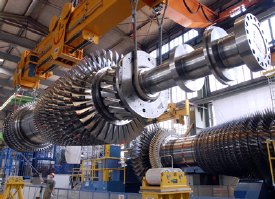Feb 15 2010
Siemens technologies took first place in two categories of the first Innovation Prize for Climate and Environment awarded by Germany’s Federal Environment Ministry and the Federation of German Industries (BDI). German Environment Minister Norbert Röttgen and BDI Director General Werner Schnappauf presented the awards – totaling €125,000 – to winners in five categories in Berlin on Thursday.
 The SGT5-8000H gas turbine developed by Siemens for the power plant in Irsching was completed in Berlin in late April 2007. With an output of 370 megawatts (MW), it is the largest and most powerful gas turbine in the world.
The SGT5-8000H gas turbine developed by Siemens for the power plant in Irsching was completed in Berlin in late April 2007. With an output of 370 megawatts (MW), it is the largest and most powerful gas turbine in the world.
For the world’s most efficient gas turbine, Siemens Energy placed first in the “Green products and services” category. For the first dishwasher to use special minerals for speeding up the drying process, BSH Bosch und Siemens Hausgeräte GmbH was awarded first place in the category “Innovation for climate protection – products and services.”
“The award proves that innovations for climate protection and sustainability are the right approach,” said Barbara Kux, member of Siemens’ Managing Board and the company’s Chief Sustainability Officer. “Technological leadership is helping us continue our success in these difficult economic times. Our Environmental Portfolio grew 11 percent in 2009 and is, thus, a key stabilizing factor in our business. At some €23 billion, the Portfolio accounts for nearly a third of our total revenue, making Siemens the world’s largest supplier of green products and solutions.”
“Our new gas turbine shows that climate protection and fossil power generation are not mutually exclusive,” said Michael Süß, CEO of the Fossil Power Generation Division of Siemens’ Energy Sector. “This innovation will make it possible to continue supplying electrical energy at an affordable price in the future.” The gas turbine is the centerpiece of a combined-cycle power plant (CCCP) operated by E.ON in Irsching, near Ingolstadt, Germany. The turbine of superlatives is more than 13 meters long, five meters high and, at 444 tons, weighs more than the world’s largest passenger airplane. On its own, the gas turbine generates 370 megawatts of electricity. Once it is connected with a steam turbine, output will rise to roughly 570 megawatts, an amount sufficient to meet the electricity needs of some 3.4 million people – roughly the entire population of Berlin. The plant will achieve a world record efficiency level of more than 60 percent, which will benefit both the environment and the climate: annual CO2 emissions from each new plant of this type will be about 700,000 tons below the average emission level for power generation worldwide – a reduction equal to the total emissions of 350,000 cars driven 15,000 kilometers a year.
The speedMatic dishwasher proves that consumers, too, can contribute to climate protection. “In the last 20 years, we’ve cut our dishwashers’ energy consumption in half. The new zeolite technology provides an enormous increase in efficiency, using a further 20 percent less electricity than the most economical dishwashers on the market today,” said Kurt-Ludwig Gutberlet, head of BSH Bosch und Siemens Hausgeräte. “In 2008, we were designated the most sustainable company in Germany. This is just the next step.” The dishwasher’s unique technology utilizes zeolites – aluminum silicate minerals with a very large surface area and hollow pores – which can absorb water and become hot in the process. As a result, the drying cycle is considerably faster and more efficient. Even the puddles of residual water that accumulate in the indentations of cups and plastic containers that are otherwise always covered with water are dried up in seconds by the warm air released from the zeolite pellets. In the next washing cycle, the minerals are regenerated when moisture is removed from them as the dishwasher heats up. Plans now call for using the technology not only in top-of-the-range dishwashers but also in medium-priced models.